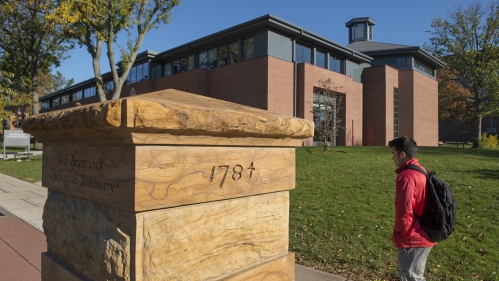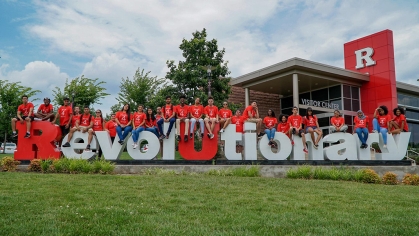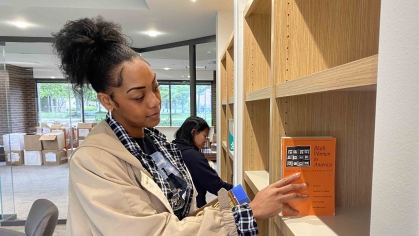Labyrinth Events Offer Community and Connection to Rutgers—New Brunswick Community

When Reverend Katrina Jenkins was hired as the assistant dean of faith and spirituality in Off-Campus Life and Community Initiatives (OCLCI) in the Dean of Students Office, she immediately brought a new focus to interfaith organizing across the Rutgers—New Brunswick community.
Soon after her hiring, Jenkins also began promoting something less familiar to students, staff, and faculty: labyrinth activities and workshops.
In April, Jenkins will be co-hosting two labyrinth-focused events: a Labyrinth 101 Workshop on Tuesday, April 1st, from 9 A.M. - 11:30 A.M., and an Advanced Labyrinth Workshop on Wednesday, April 2nd, from 9 A.M. - 12 P.M. Both will be held at the New Brunswick Theological Seminary on College Avenue Campus.
“Anyone can walk a labyrinth, no matter who you are or what you believe,” Jenkins said. “It’s a good spiritual practice for those who need to connect themselves to a high power, to other people, and to themselves. Labyrinths are a journey through life, journey through faith, journey through spirituality, and just a journey in general.”
Jenkins has been incorporating labyrinths into her work at higher education institutions for a long time; at Rollins College, her previous institution, she even managed to obtain donation money for a permanent labyrinth. Much of her labyrinth programming has been done with Frank Faine, who will be co-hosting next week’s events with her and who works as a labyrinth consultant and educator.
Faine is a trained facilitator and an active member in the Labyrinth Society. When applying labyrinth work to higher education audiences, he emphasizes how labyrinths are crucial to many folks of all ages and backgrounds.
“I think what struck me and what continues to strike me is how the labyrinth builds community and speaks to us wherever we are,” he said. “One of the founders of the modern labyrinth movement said, ‘I believe that the labyrinth will take you where you want to go, but it’s not a stretch that the labyrinth will also take you where you need to go.’”
Faine and Jenkins have already had success with labyrinth work at Rutgers. Last February, Jenkins and Faine hosted in-person training sessions designed to show staff how to utilize labyrinths with students or colleagues, and Jenkins has continued to both host virtual labyrinth workshops and in-person workshops for specific departments throughout the calendar year.
Although their previous sessions have drawn a diverse array of staff and faculty participants, Jenkins and Faine hope that these sessions will spark more interest in the student body.
“At Rollins College, we had a very robust labyrinth program where we worked with student athletes, the wellness center, various classes, the music department, and much more,” Faine said. “We used it for walks on sexual violence, on grief, on kindness, and to celebrate the end of the first year of the pandemic.”
Jenkins echoed Faine, underlining the variety of ways that labyrinths can be useful to different students or student groups.
“We think that this is a great tool for individual students, for groups and organizations, to come and do together,” Jenkins said. “We can tailor the labyrinths to their needs.
“Anyone can walk labyrinths as individuals or as communities. You can walk labyrinths to connect spiritually, to manage conflicts with others, or to reconcile. If you’re looking for a new practice or a new way to center yourself, just try it out.”
You can learn more and register for these upcoming events here. For our previous article on Reverend Katrina Jenkins, you can click here.



